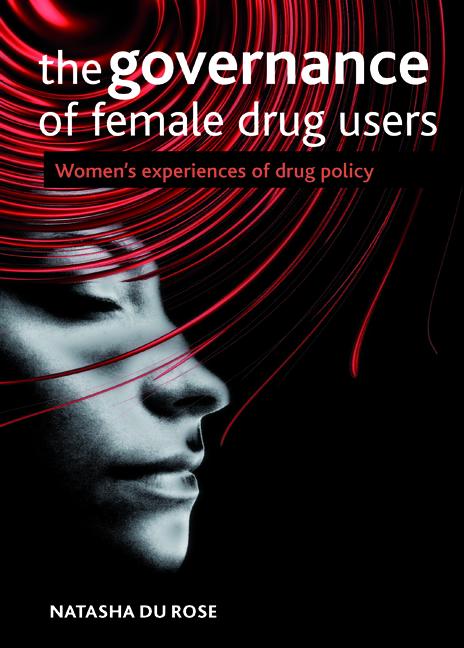Part Two
Published online by Cambridge University Press: 10 March 2022
Summary
The next three chapters draw on Foucault's concepts of governmentality and technologies of power to provide an analysis of the specific governmental techniques and procedures adopted in contemporary drug policy. They examine three key technologies of power through which women users are governed: prohibition, medicalisation and welfarisation. Foucault describes governmentality or the ‘art of government’ as ‘the encounter between technologies of the domination of others and those of the self ‘ (Foucault, 2000 [1982], p 225). Prohibition, medicalisation and welfarisation may be seen as technologies of domination. These are practices of power that ‘determine the conduct of individuals and submit them to certain ends’ (p 225). Through these technologies relations of power become ‘firmly set and congealed’, and the freedom of the individual becomes ‘extremely constrained and limited’ (Foucault, 2000 [1984], p 283). Prohibition, medicalisation and welfarisation can also be seen as:
… technologies imbued with aspirations for the shaping of conduct [behaviour] in the hope of producing certain desired effects and averting certain undesired ones. (Rose, 1999, p 52)
In the governance of illicit drug use prohibition, medicalisation and welfarisation form a curious meld as the criminal justice system, medical treatment establishment and welfare regimes intersect in the regulation of illicit drug use.
The technology of prohibition is the practice of prohibiting the manufacture, transportation, import, export, sale and consumption of certain drugs by law. The rationale underpinning prohibition is that unlawful drugs are dangerous to the health of the individual. Prohibition is enforced through the technology of punishment. Punishment as exercised by the state in law involves matching fair consequence to crimes to achieve justice. A fundamental element of punishment is the process of criminalisation, which, in modern neoliberal societies, is a tactic of government that endures after sentencing due to the criminal records system.
The medicalisation of drug use is based on the ‘disease’ model of addiction, and the distinction between ‘normal’ and ‘out-of-control’ behaviour. Historically, women, the poor, the working class and immigrants are assumed to be more at risk of the disease of addiction or the ‘disease of the will’. However, the medicalisation of women’s illicit drug use is arguably an inconsistent aspect of drug policy when the over-prescribing of legal drugs to women and their dependence on them is taken into account.
- Type
- Chapter
- Information
- The Governance of Female Drug UsersWomen's Experiences of Drug Policy, pp. 61 - 66Publisher: Bristol University PressPrint publication year: 2015



